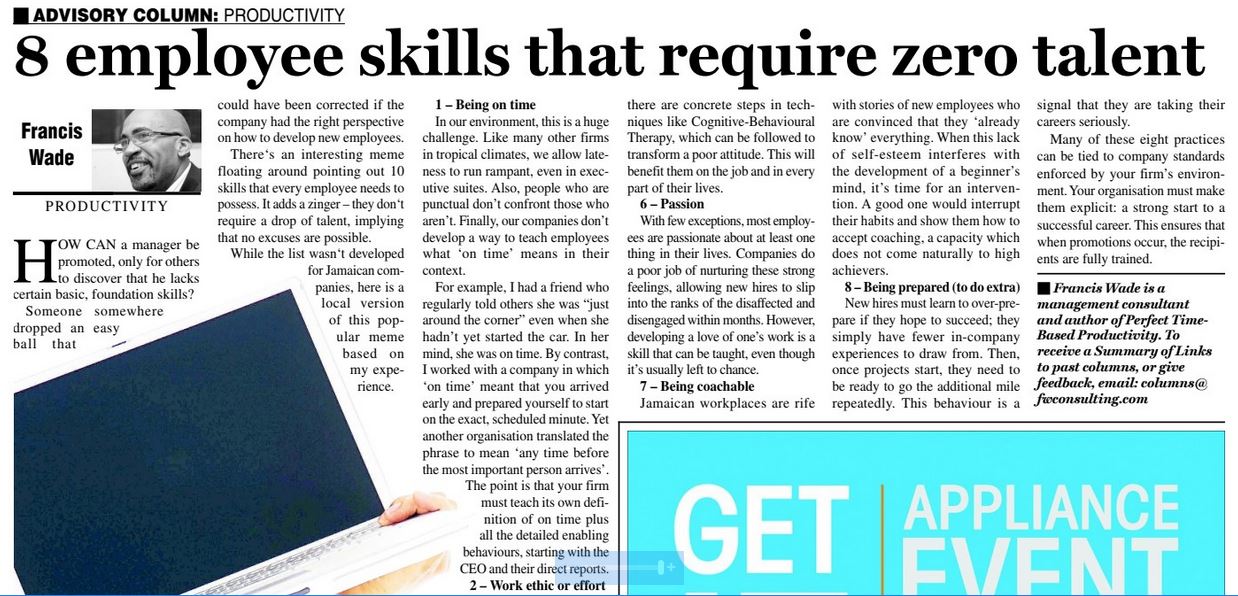How can a manager be promoted, only for others to discover that he lacks certain basic, foundation skills? Someone, somewhere dropped an easy ball that could have been corrected if the company had the right perspective on how to develop new employees.
There‘s an interesting meme floating around pointing out 10 skills that every employee needs to possess. It adds a zinger: they don‘t require a drop of talent, implying that no excuses are possible. While the list wasn‘t developed for Jamaican companies, here is a local version of this popular meme based on my experience.
#1 – Being On Time
In our environment, this is a huge challenge. Like many other firms in tropical climates, we allow lateness to run rampant, even in executive suites. Also, people who are punctual don‘t confront those who aren’t. Finally, our companies don’t develop a way to teach employees what “on time” means in their context.
For example, I had a friend who regularly told others she was “just around the corner” even when she hadn’t yet started the car. In her mind, she was “on time.” By contrast, I worked with a company in which “on-time” meant that you arrived early and prepared yourself to start on the exact, scheduled minute. Yet another organization translated the phrase to mean “anytime before the most important person arrives.”
The point is that your firm must teach its own definition of “on time” plus all the detailed enabling behaviors, starting with the CEO and her direct reports.
#2 – Work Ethic/Effort
New employees are often slow to appreciate that for every corporate skill, there is a ladder of accomplishment. Unfortunately, those who are unaware, usually occupy the lowest rung. This is no matter of disrespect.
The fact is, if they are taught the existence of higher skills and how to achieve them, they can become inspired.Their objective, before they are confirmed as full-time staff, should be to show they have climbed the rungs of some key skills. For example, a summer student should be able the demonstrate an unbroken string of on-time arrivals at work. These may seem to be too easy, but don’t under-estimate the effort required to learn new behaviors and apply them consistently.
#3 – Body Language
Have you ever seen a young person slouch in his office chair, apparently ready to doze off? Newly hired workers just aren’t taught that their body language influences others. The impact on customers, colleagues and managers is part of what they will be held accountable for.
#4 – Energy
Whereas it may not have been cool to be an eager-beaver in their prior lives, young employees need to learn that the tables are now turned. How they get work done is vitally important, and they aren‘t “allowed” to have a bad day that drags down others. Every hour is intended to be an opportunity for enthusiasm and engagement, and they must learn to manage their sleep and nutrition to accomplish this goal. Habitually overcoming the “I-don‘t-feel-like-it” blues is a vital new capacity to develop.
#5 – Attitude/Resilience
This is perhaps a nebulous skill but companies need to go beyond the level of cliches and define it clearly. Science has shown that there are concrete steps in techniques like Cognitive-Behavioural Therapy which can be followed to transform a poor attitude. This will benefit them on the job and in every part of their lives.
#6 – Passion
With few exceptions, most employees are passionate about at least one thing in their lives. Companies do a poor job of nurturing these strong feelings, allowing new hires to slip into the ranks of the disaffected and disengaged within months. However, developing a love of one’s work is a skill that can be taught, even though it’s usually left to chance.
#7 – Being CoachableJamaican workplaces are rife with stories of new employees who are convinced that they “already know” everything. When this lack of self-esteem interferes with the development of a “Beginner’s Mind” it’s time for an intervention. A good one would interrupt their habits and show them how to accept coaching, a capacity which does not come naturally to high achievers.
#8 – Being Prepared (To Do Extra)
New hires must learn to over-prepare if they hope to succeed; they simply have fewer in-company experiences to draw from. Then, once projects start, they need to be ready to go the additional mile repeatedly. This behavior is a signal that they are taking their careers seriously.
Many of these eight practices can be tied to company standards enforced by your firm’s environment. Your organization must make them explicit: a strong start to a successful career. This ensures that when promotions occur, the recipients are fully trained.

